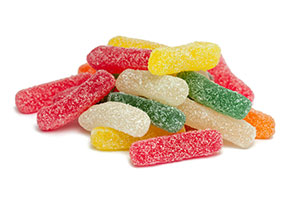 Some of the Worst Foods Aren’t What You Expect
Some of the Worst Foods Aren’t What You Expect
If you’re like many Americans, you’re more concerned than ever about trying to eat healthily. As well as eating nutritious foods that are good for your overall health, be sure to avoid the foods that are the worst for your teeth. At the very least, make yourself aware of their potential drawbacks so you can minimize your exposure, as well as brush and floss after indulging!
In no particular order, here are the 9 Worst Foods For Teeth
Sour Gummies
Most candies are bad for teeth due to high amounts of sugar. This variety, however, is especially harmful. Sour gummies/jellies are high in acid, altering the ph balance of your mouth. This acidity, in turn, can weaken and even begin to dissolve enamel, making teeth prone to cavities. Additionally, the texture of the gummies causes them to stick between teeth in those hard-to-reach places. Combine these two factors, and it’s a recipe for disaster that makes sour gummies one of the worst foods for teeth.
Dried Fruits
Fruits may seem like a healthy option, and they may indeed provide some essential nutrients like vitamins. However, due to their sticky, chewy consistency, they are likely to get stuck in between teeth. They also may be relatively high in sugar, so make sure to brush and floss regularly after enjoying these types of dried fruit snacks.
Bread
Many people avoid bread and other carbohydrates as part of a weight-loss diet. They may be on to something when it comes to tooth health as well. Simple carbohydrates are easily broken down by saliva in the mouth. Fluffy bread quickly becomes a sticky paste that’s high in sugar. Again, this causes the food to become trapped between teeth and may lead to more overall cavities in the future.
Chips and Crackers
For the same reasons that bread can be harmful to teeth, chips and crackers can also be a problem. Simple carbohydrates are converted to sugar by your saliva, increasing the risk for cavities. Additionally, when you don’t remove debris after snacking, it can get stuck between teeth and encourage plaque buildup.
Soda (and other carbonated drinks)
Soft drinks, sparkling water, and energy drinks have the fizzy bubbles we all seem to love. However, this carbonation comes at a price. They all have elevated acidity, which can damage teeth. Most are also very high in sugar, so it’s best to avoid them altogether. If you do indulge yourself with a soda, make sure to brush afterward. Or, at the very least, rinse your mouth with water once you’ve finished.
Alcohol
Much like soda, many alcoholic drinks are high in sugar and acidity that can harm teeth. Additionally, alcohol can dry up the saliva of the mouth, leaving your teeth at even higher risk for cavities.
Coffee
While it does have healthy properties such as anti-oxidants, coffee also poses several dangers to teeth. First, it can be high in acidity, threatening the strength of your teeth. Also, many people prefer to add sugar or other sweeteners, causing more problems for teeth. Finally, especially if you drink your coffee black, it can cause staining to your tooth enamel and put a real damper on the appearance of your smile.
Citrus
Fresh fruits and vegetables are an excellent, healthy choice to include in any diet. However, the fruits of the citrus variety have high acid content and can be harmful to teeth and enamel. The most widely known types of citrus fruit include oranges, lemons, limes, grapefruits, kumquats, and citrons.
Ice
Even though it’s just water, habitually chewing on ice cubes exposes teeth to potential damage. Ice is hard, and while tooth enamel is the hardest substance in the human body, crunching ice can take its toll. It’s best to avoid this harmful habit altogether. If you need a replacement activity to relieve mouth stress, try chewing sugar-free gum instead.
